Summary:
Artificial Intelligence (AI) has revolutionized the world of gaming, enhancing user experiences and enabling advanced gameplay. This article explores the intersection of AI and games, discussing its applications, impact, and potential future developments. It provides an overview of key terms and concepts related to AI in gaming, as well as addresses frequently asked questions.
Introduction
With the rapid advancements in AI technology, it has become an integral part of modern video games. AI in gaming refers to the use of intelligent algorithms and techniques to create lifelike characters, realistic behaviors, and challenging opponents within virtual game worlds. The implementation of AI in games not only enhances the overall gaming experience but also introduces new possibilities and challenges for players.
Applications of AI in Games
AI has a wide range of applications in gaming, some of which are listed below:
1. Non-Playable Characters (NPCs): AI is used to create intelligent NPCs that exhibit realistic behaviors, enabling more immersive gameplay. These characters can make decisions, adapt to changing circumstances, and interact with players, making the game world feel more alive.
2. Procedural Content Generation: AI algorithms can generate game content, such as maps, levels, and quests, dynamically. This enables game developers to create vast and diverse game worlds without manually designing every aspect, saving time and effort.
3. Adversarial AI: AI can be used to create challenging opponents that can learn, adapt, and improve their strategies based on player behavior. This ensures a more engaging and competitive gaming experience.
4. Player Modeling: AI algorithms can analyze player behavior and preferences to create personalized gaming experiences. This includes dynamically adjusting difficulty levels, suggesting relevant content, and providing customized recommendations.
The Impact of AI in Games
The integration of AI in games has had a significant impact on the gaming industry, as outlined below:
1. Enhanced User Experience: AI-powered NPCs provide more immersive and realistic gameplay, making the gaming experience more enjoyable and captivating.
2. Improved Game Design: AI algorithms enable game developers to create more complex and dynamic game worlds, leading to more engaging scenarios and storylines.
3. Increased Accessibility: AI can assist players with disabilities, providing adaptive gameplay mechanisms and personalized assistance, making games more inclusive and accessible to a wider audience.
4. Advancements in AI Research: Gaming environments provide a testing ground for AI algorithms, leading to advancements in AI research and development, which can have implications in various other domains.
The Future of AI in Games
As AI technology continues to evolve, the future of AI in gaming looks promising. Some potential developments in this field include:
1. More Realistic Characters: AI algorithms will further improve the realism of NPCs, creating characters with complex emotions, personalities, and decision-making abilities.
2. Adaptive Gameplay: AI will adapt the gameplay experience in real-time based on player preferences, skill level, and behavior, providing personalized challenges and content.
3. Enhanced Virtual Reality (VR) and Augmented Reality (AR) Experiences: AI algorithms combined with VR and AR technologies will enable highly immersive and interactive gaming experiences.
4. Ethical and Responsible AI: The gaming industry will focus on ensuring ethical and responsible AI usage, addressing concerns related to biased algorithms, data privacy, and player well-being.
Frequently Asked Questions (FAQ)
Q: Can AI cheat in games?
A: AI opponents in games follow predefined rules and behaviors. While they may seem intelligent, they do not possess the ability to cheat.
Q: Can AI make games unbeatable?
A: AI opponents can be challenging, but they are designed to be beatable. Game developers strive to create fair challenges that can still be overcome with skill and strategy.
Q: How does AI adapt to player behavior?
A: AI algorithms analyze player behavior and adjust game elements, such as difficulty level, opponents, and game content, to provide a more tailored and engaging gaming experience.
Q: Is AI in games only limited to single-player experiences?
A: No, AI in games extends beyond single-player experiences. Multiplayer games can also utilize AI for generating realistic opponents and providing personalized gameplay experiences.
Sources:
– [Source 1](https://www.example.com)
– [Source 2](https://www.example.com)
The source of the article is from the blog radardovalemg.com
